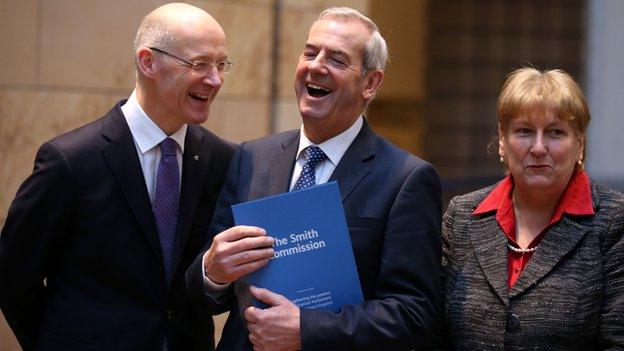Audit Scotland warning over new Scottish tax body delays
- Published

Scotland's new tax collection agency has been criticised by auditors over delays in recruiting staff and developing computer systems.
Revenue Scotland is due to take over the Land and Buildings Transaction Tax (LBTT) and the Scottish Landfill Tax on 1 April next year.
But Audit Scotland said the new body risked not being fully ready to begin collecting the taxes.
The Scottish government said preparations were "on track".
The new powers over LBTT - which is replacing stamp duty - and Landfill Tax were announced in the Scotland Act 2012.
Audit Scotland said it was worried the collection system might not be fully functional by next April - potentially increasing paperwork, processing times and costs.
Scotland is set to be given further tax raising powers - including over income tax rates and bands - following the publication of the Smith Commission into extra devolution.

The Smith Commission set out new tax raising powers for the Scottish Parliament in addition to those contained in the Scotland Act 2012
The Audit Scotland report said: "Given the large volume of transactions anticipated, any move away from the electronic processing of LBTT is likely to have cost and performance implications.
"Revenue Scotland plans to decide in December 2014 whether it needs to implement any of its contingency plans.
"This could, for example, lead to an increase in processing costs and may bring reputational risks for Revenue Scotland."
Caroline Gardner, Auditor General for Scotland, said: "The Scottish government successfully developed the legislative framework for the devolved taxes but it must ensure that staff and systems are fully in place to manage the increased responsibilities that the Scotland Act brings."

Contingency plans
Glenn Campbell, political correspondent
The watchdog is worried that Revenue Scotland won't be fully ready to collect landfill tax and land and buildings transaction tax from 1 April 2015.
It says delays in recruiting staff and developing computer systems have increased the risk of problems.
The finance secretary, John Swinney, says he is "confident" the system will work from day one and Revenue Scotland has "contingency plans" in case he's wrong about that.
Plan B would involve manually processing the tax on some or all of the 450-600 land and buildings transactions expected every day.
Audit Scotland says this will increase paperwork, processing times and costs. But it also warns of "reputational risks" for Revenue Scotland.
These are risks the new tax collector cannot really afford to run.
It needs to establish itself as an effective agency to ensure the Scottish government has the cash it needs to fund public services.
But it also needs to prove that it will be capable of taking on the new tax responsibilities that will come under the Smith commission's proposals for further devolution.

Deputy First Minister and Finance Secretary John Swinney said the Scottish government was closely monitoring Revenue Scotland's progress.
He said: "Revenue Scotland has in place a team with expert legal, financial, leadership and operational tax experience, and the detailed phased recruitment plan to deliver the necessary operational staff is progressing on track.
"Technical guidance on the two taxes is currently being consulted on with external stakeholders and future users of our online tax system are currently being recruited to help us ensure it is user-friendly, effective and efficient.
"Development of IT is proceeding well and is on track to be completed in good time for the roll-out of tax collection in Scotland this April."
Mr Swinney said he was confident that "robust plans" were in place to ensure smooth delivery of the service, and said it was "heartening" to see this planning acknowledged by Audit Scotland.
But Labour MSP Iain Gray said Mr Swinney must "take responsibility for the catalogue of failings highlighted by Audit Scotland."
'Potential delay'
He added: "This reports blows a hole in any credibility the Scottish government had left. The SNP has spent the last three years calling for more tax-raising powers. This is laughable given their inept stewardship of the ones they already have."
Liberal Democrat MSP Tavish Scott said SNP ministers "must be up-front about any potential delay" to the roll-out.
He said: "We want assurances that the government are actively tackling these problems before they snowball into a full-scale delay."
Scottish Conservative finance spokesman Gavin Brown MSP called on Mr Swinney to make a statement to the Scottish parliament, adding: "This goes live in April, and now we learn the IT programme is months behind schedule."
- Published27 November 2014
